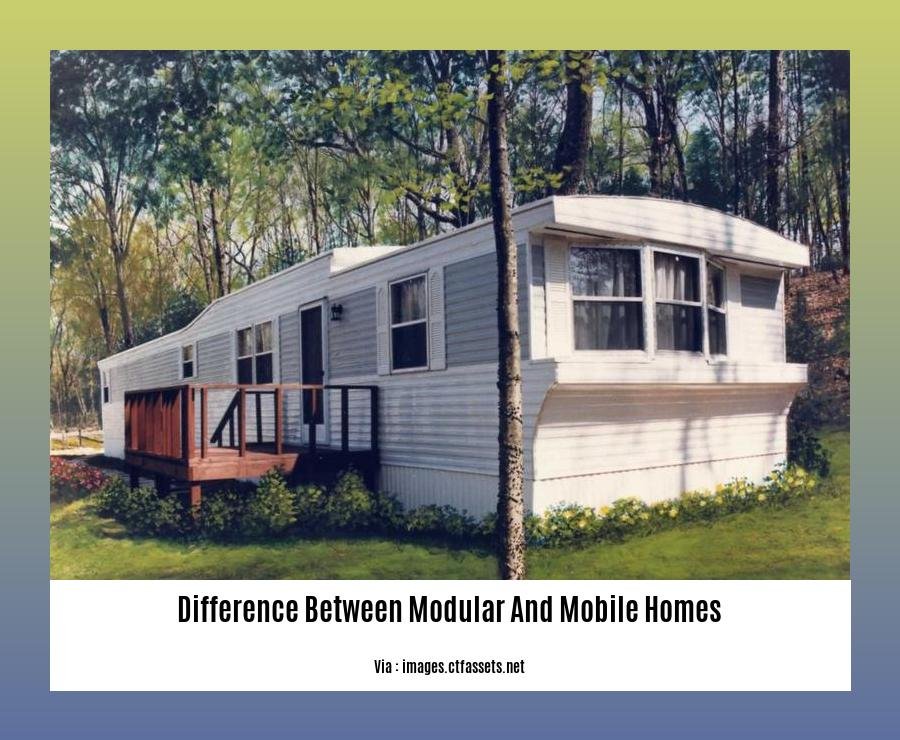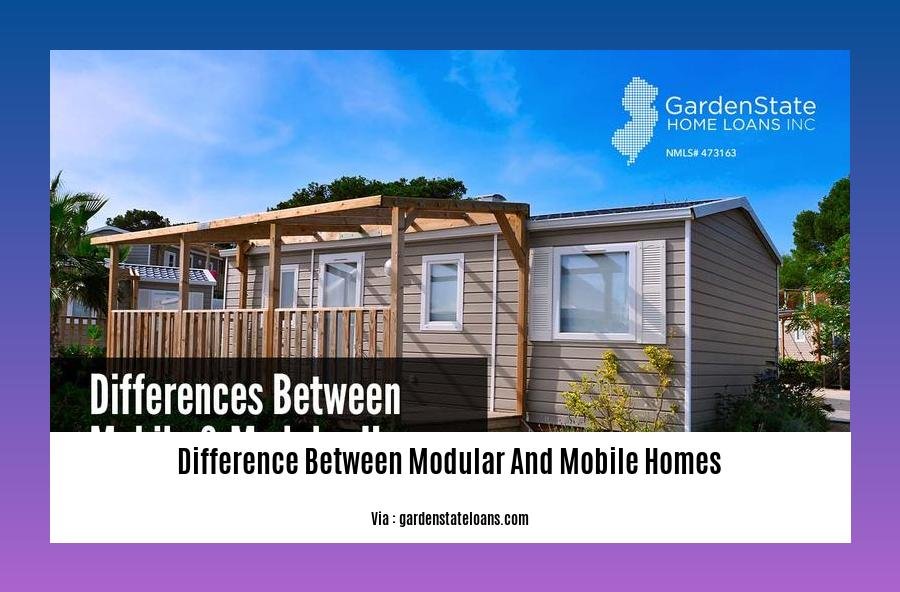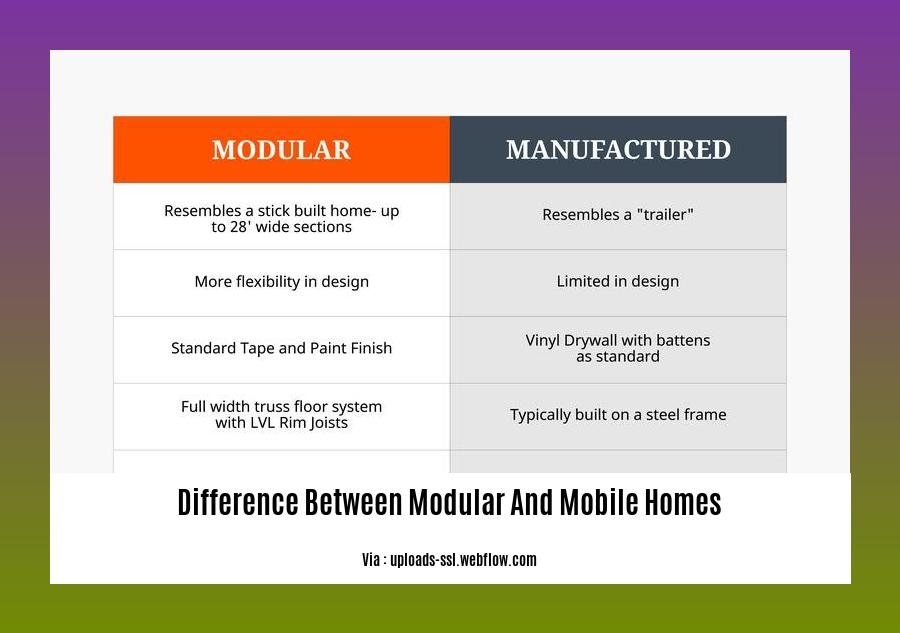Embark on a comprehensive journey to unravel the intricate tapestry of distinctions between modular and mobile homes in our meticulously crafted guide – [-Understanding the Difference Between Modular and Mobile Homes: A Comprehensive Guide-]. Delve into the depths of their unique attributes, advantages, and drawbacks, illuminating the path toward an informed decision regarding your future dwelling.
Key Takeaways:
-
Construction: Mobile homes are built entirely in factories and transported as a single unit, while modular homes are built in large sections and then assembled on-site.
-
Mobility: Mobile homes can be moved, as they rest on pairs of wheels, while modular homes are permanently fixed on a foundation.
-
Building Codes: Mobile homes must adhere to federal HUD codes, while modular homes need to meet local and state building codes.
Difference Between Modular and Mobile Homes

When considering your ideal living space, it’s important to understand various housing options. Two increasingly popular ones are modular and mobile homes. Both offer unique advantages and suit different lifestyles. Understanding their key distinctions can help you make an informed decision about your future home.
Construction and Placement
Modular Homes:
– Built in sections in a climate-controlled factory.
– Transported and assembled on-site.
– Constructed according to local building codes and standards.
– Placed on a permanent foundation, often indistinguishable from traditional homes.
Mobile Homes:
– Constructed entirely in a factory and transported as complete units.
– Commonly placed on land that allows movable structures or in mobile home parks.
– Built to meet federal Manufactured Housing Construction and Safety Standards (HUD Code).
– Typically have a metal chassis with wheels and hitches for towing.
Design and Customization
Modular Homes:
– Wide range of designs and floor plans available.
– Options for customization, including materials, fixtures, and finishes.
– Larger in size compared to mobile homes, with more living space.
Mobile Homes:
– Limited design options due to standardized construction.
– Fewer customization options, usually restricted to interior décor and appliances.
– Smaller in size, with space optimization being a key design consideration.
Cost and Maintenance
Modular Homes:
– Generally higher initial cost than mobile homes.
– Lower maintenance costs due to higher-quality materials and construction standards.
– Longer lifespan, potentially increasing resale value.
Mobile Homes:
– Lower initial cost, making them more affordable.
– Lower-quality materials and construction may lead to higher maintenance costs.
– Shorter lifespan and depreciating value over time.
Zoning and Regulations
Modular Homes:
– Treated like traditional site-built homes, subject to local zoning and building regulations.
– Require a permit and inspection before placement on a permanent foundation.
Mobile Homes:
– Subject to zoning restrictions for manufactured homes or mobile home parks.
– May require special permits for installation or relocation.
Environmental Impact
Modular Homes:
– Built in a controlled factory environment, reducing waste and environmental impact.
– Energy-efficient construction methods help minimize operational costs.
Mobile Homes:
– Built in factories with less stringent environmental regulations.
– Older models may have lower energy efficiency ratings, leading to higher utility bills.
Conclusion:
Modular and mobile homes offer distinct living experiences, catering to different needs and budgets. Modular homes provide a more permanent, customizable living solution, while mobile homes are more affordable and offer flexibility in placement. Weighing these factors and considering your individual preferences will help you determine the ideal home for your lifestyle.
-
Need an expert to help you find the best deals on mobile homes? Dive into our extensive guide on dealers for mobile homes to connect with reliable providers in your area.
-
Confused about the intricacies of modular and manufactured homes? Uncover the difference between modular and manufactured homes to make an informed decision that suits your lifestyle and budget.
-
Ready to enhance your home security? Explore the different types of home security systems available and choose the one that best safeguards your property and loved ones.
-
Discover the potential drawbacks of relying on home delivery services. Learn about the disadvantages of home delivery to ensure you make informed decisions when choosing your shopping options.
Modular homes are typically more expensive than mobile homes, but they also tend to be more customizable and durable.

Modular homes and mobile homes represent distinct living solutions with varying characteristics. While modular homes offer customization and durability at a higher price point, mobile homes provide affordability and mobility. Understanding their differences can help you make an informed choice.
Key Takeaways:
-
Manufacturing:
-
Modular homes are assembled from prefabricated sections in a controlled environment.
-
Mobile homes are built entirely in factories and transported as complete units.
-
Customization Options:
-
Modular homes allow for a wide range of designs, floor plans, and customization options.
-
Mobile homes typically have limited design and customization options due to their factory-built nature.
-
Construction Quality:
-
Modular homes are generally built with higher-quality materials and construction methods.
-
Mobile homes may be built with lower-quality materials to meet affordability and transportation requirements.
-
Cost:
-
Modular homes are typically more expensive due to the higher cost of materials, customization options, and on-site assembly.
-
Mobile homes are generally more affordable, making them a budget-friendly option.
-
Lifespan:
-
Modular homes have a longer lifespan compared to mobile homes, lasting up to 50 years or more with proper maintenance.
-
Mobile homes typically have a lifespan of 20 to 30 years, depending on the quality of construction and maintenance.
-
Mobility:
-
Modular homes are permanently affixed to a foundation and are not designed to be moved.
-
Mobile homes are built on movable chassis, allowing them to be relocated to different locations.
-
Zoning and Regulations:
-
Modular homes are subject to local zoning and building codes like site-built homes.
- Mobile homes have separate zoning and regulations, often managed by state or federal authorities.
Considering these factors, modular homes excel in customization, durability, and construction quality, while mobile homes prioritize affordability and mobility. Both options cater to diverse needs, and the best choice depends on your budget, lifestyle, and long-term housing goals.
Sources:
Modular Homes vs. Manufactured Homes: What’s the Difference?
Manufactured Homes vs. Modular Homes: What’s the Difference?
Mobile homes are typically more energy-efficient than modular homes, but they also tend to have a shorter lifespan.
When it comes to choosing a new home, there are many factors to consider, including cost, construction type, and energy efficiency. Modular and mobile homes are two popular options for those looking for affordable and efficient housing.
Modular homes are built in sections in a factory and then assembled on-site. They are similar to traditional site-built homes in terms of quality and construction standards but can be more energy-efficient due to the controlled factory environment. Mobile homes, on the other hand, are built entirely in a factory and then transported to the site in one piece. They are generally less expensive than modular homes, but they may be less energy-efficient and have a shorter lifespan.
Key Takeaways:
- While modular homes are typically more energy-efficient, mobile homes are less expensive.
- Both modular and mobile homes have shorter lifespans compared to traditional site-built homes.
- Modular homes can be customized to meet specific needs, while mobile homes offer limited customization options.
- Both modular and mobile homes are subject to zoning regulations and building codes.
- Modular homes are built in sections and assembled on-site, while mobile homes are built entirely in a factory.
Sources:
1. Mobile and Modular Homes – ENERGY STAR
2. Manufactured vs. Mobile vs. Modular Homes – CoverTree
Modular Homes: Navigating Financing Differences
Welcome readers, to our fascinating journey comparing modular and mobile homes. Today, we’re diving into the nitty-gritty of financing, a key aspect that can make a world of difference in your homeownership dream. While both modular and mobile homes offer unique advantages, they’re treated differently when it comes to financing due to their distinct property classifications.
Key Takeaways:
- Modular Homes: Recognized as Real Property
- Mobile Homes: Categorized as Personal Property
- Financing Options: Influenced by Property Classification
- Benefits of Modular Home Financing: More Accessible, Favorable Rates
- Challenges of Mobile Home Financing: Limited Options, Stringent Requirements
So, what’s the big deal about property classification? Let’s break it down. Modular homes, those built in sections and assembled on-site, are considered real property, akin to traditional stick-built homes. This distinction gives them a major edge when it comes to financing.
Modular Home Financing: Unlocking Accessibility and Favorable Rates
Modular homes are often financed just like site-built homes. You can obtain a traditional mortgage from a bank or credit union, offering more options and potentially more favorable interest rates. The stability and permanence associated with modular homes make them a solid investment, enticing lenders to extend financing.
Mobile Home Financing: Navigating Limited Options and Stringent Requirements
Mobile homes, often constructed entirely in a factory and transported to the site, are categorized as personal property, similar to vehicles. This classification can make financing more challenging. Lenders may view mobile homes as less stable investments, leading to limited financing options and potentially higher interest rates. You might encounter specialized lenders or personal property loans tailored specifically to mobile homes.
Remember, this isn’t a one-size-fits-all situation. Every financial institution has its own criteria and policies. It’s crucial to do your research, compare various lenders, and explore all available options before making a decision.
Additional Considerations:
- Location Matters: Property laws and regulations vary across regions. Consult local authorities to understand specific rules and financing implications.
- Mobile Home Parks: If you plan to place your mobile home in a mobile home park, there might be additional fees and considerations.
Sources:
Fannie Mae: Financing Manufactured Homes
Freddie Mac: Financing Manufactured Homes
FAQ
Q1: What is the key difference between modular and mobile homes?
A1: Modular homes are built in sections and assembled on-site, while mobile homes are built entirely in a factory and transported as a single unit.
Q2: Which type of home has stricter building code requirements?
A2: Modular homes must adhere to local and state building codes, while mobile homes only need to meet federal HUD codes.
Q3: Are modular homes more expensive than mobile homes?
A3: Modular homes may have a higher upfront cost compared to mobile homes, but they may also offer more customization options and a higher resale value.
Q4: Are modular homes more durable than mobile homes?
A4: Modular homes typically have a longer lifespan than mobile homes, with an average lifespan of 30-50 years compared to 15-20 years for mobile homes.
Q5: Can modular homes be moved?
A5: Modular homes are not designed to be moved once they are assembled on-site, while mobile homes can be moved from one location to another.
- Are Carpenter Bees Dangerous? Stings, Damage, and Control - March 31, 2025
- How to Get Rid of Ants in the Washroom: A Complete Guide - March 31, 2025
- How Much Does Ant Extermination Cost? (2024 Guide & DIY Options) - March 31, 2025










